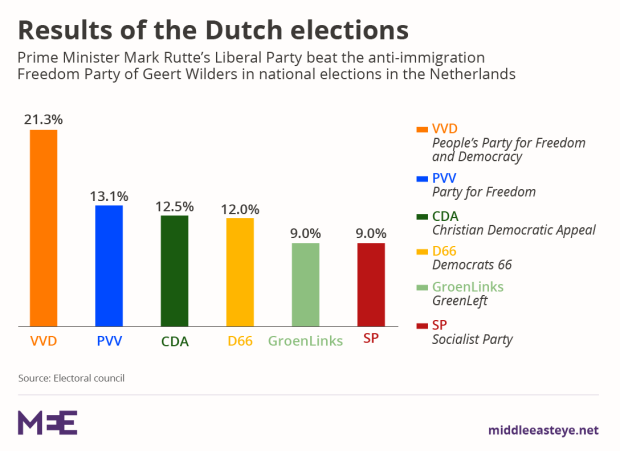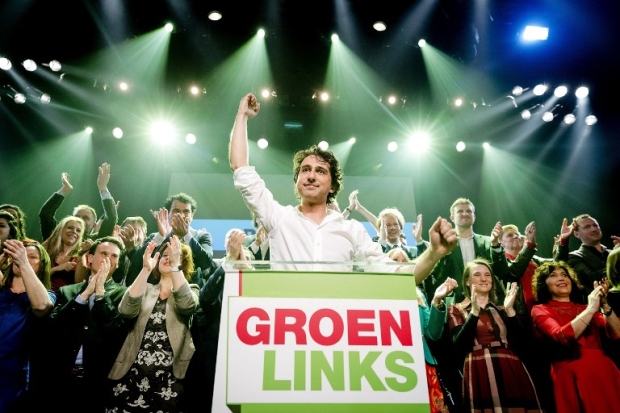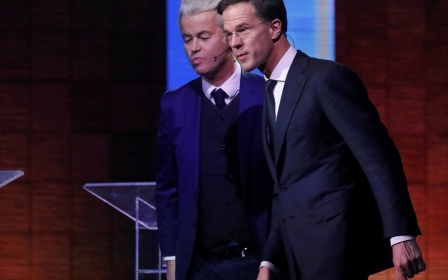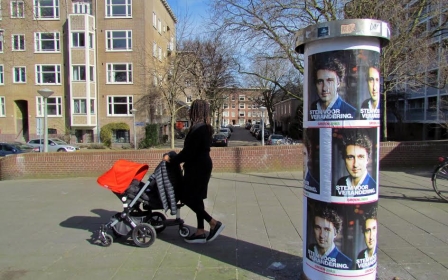'Hatred and fear didn't win': Dutch relief as voters reject Wilders
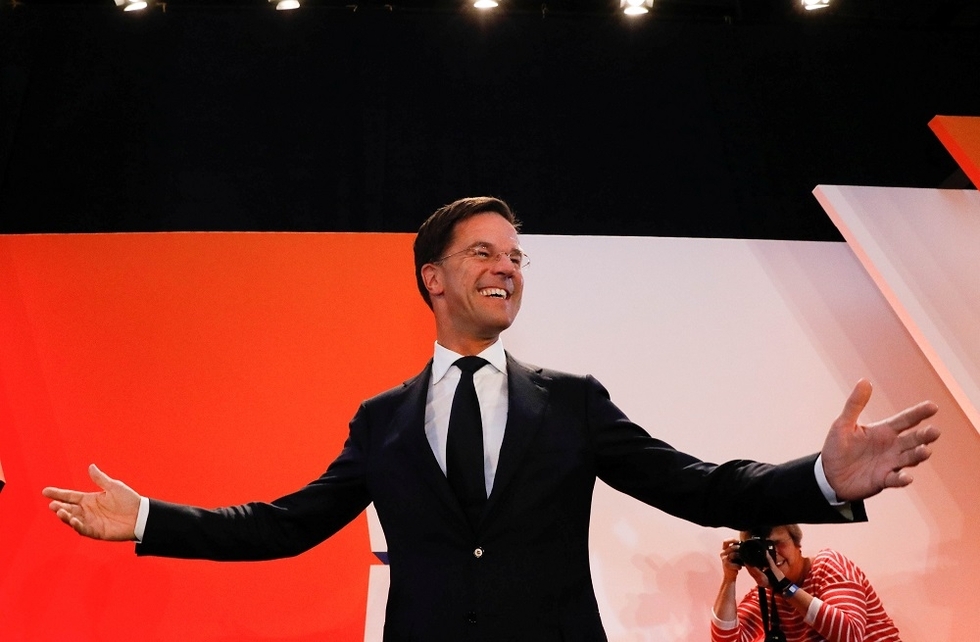
Despite warnings of a surge in populism, the Dutch voted in incumbent Prime Minister Mark Rutte for a third term on Thursday, with initial parliamentary election results showing Geert Wilders' anti-immigrant Freedom Party lagging behind in second.
“Our message to the Netherlands - that we will hold our course and keep this country safe, stable and prosperous - got through,” Rutte told supporters to applause in the early hours of Thursday as it became apparent he had beaten the challenge from the far right.
"This was an evening when, after Brexit and Trump, the Netherlands said, ‘Stop’ to the wrong sort of populism.”
With 95 percent of the votes now counted, Rutte's conservative-liberal VVD party appears to have won 33 seats in the 150-seat Dutch parliament, down from the 41 he previously held but still giving him a strong lead.
Rutte now faces the challenge of forming a coalition capable of sustaining a parliamentary majority, a process that typically takes weeks in the Netherlands and will involve talks with several other parties. He has repeatedly ruled out working with Wilders' Freedom Party (PVV), as has every other major party.
That means that Wilders, who campaigned on a virulently anti-Islam platform and used the slogan "Stop Islam", will not get into government. His party is predicted to have won 20 seats, up from 15 but far from the 30 or so it was once predicted, and less than his 2010 election result of 24.
Wilders' Freedom Party (PVV), which campaigned on a virulently anti-Islam platform and used the slogan "Stop Islam", so far has 20 seats, up from 15 but far from the 30 or so he was once predicted, and less than his 2010 election result of 24.
Wilders put a brave face on the result, tweeting: "We were the third largest party of the Netherlands. Now we are the second largest party. Next time we will be [number] one!"
Across the Netherlands, many expressed relief at the result following months of Wilders leading in the polls.
"I am glad that the PVV by far did not become the greatest party," Barbara Witlox, a speech therapist in Rotterdam, said by phone. "And I am really glad that hatred and fear ... didn't win."
"I'm very happy that Geert did not win as he had hoped," agreed Claire, a 30-year-old notary living in Amsterdam.
"Especially after the event with Turkey last weekend, the Netherlands showed that immigration is not the only important thing in politics, and I think that that and the EU exit are Geert's main points."
The PVV was widely expected to have benefited from the recent spat with Turkey, which saw Ankara slamming the Netherlands as Nazis and fascists after two Turkish ministers were denied entry to attend a pro-government rally, something Wilders had continuously campaigned for.
In the end, it seems to have provided Rutte with a last-minute boost instead, suggesting Wilders had missed a trick somewhere."If you look at the election surveys ... his potential was - or is - really remarkable," said Joost van Spanje, an associate professor at the University of Amsterdam's Communication Science Department.
"A lot of people considered voting for the PVV, so in that sense he really did not capitalise on his potential."
"Everyone expected more of Wilders because he was riding high in polls, even just a few weeks ago," he added. "So getting about 20 seats must be a real disappointment."
'The result can't be true'
Indeed, there was anger from some of those who supported Wilders. PVV voter Dave Wetsteijn, a 40-year-old welder from Rotterdam, said he felt cheated by the result.
"It's all wrong, they have committed fraud," said Wetsteijn, who has always vote for PVV, by phone. "VVD could never be the biggest party. Just look on Facebook how many people voted for Wilders."
"The result can't be true. I'm finished with this country."
Officials from across Europe, however, took to Twitter to celebrate the outcome.
German Chancellor Angela Merkel’s chief of staff, Peter Altmaier, wrote: "The Netherlands, oh the Netherlands you are a champion!..... Congratulations on this great result."
France’s foreign minister Jean-Marc Ayrault added: "Congratulations to the Dutch for stemming the rise of the far-right."
Similarly, Jean-Claude Juncker’s spokesman said the European Commission president phoned Rutte to praise him on "a vote for Europe, a vote against extremists."
But there was no message of congratulations from Ankara, with Turkish Foreign Minister Mevlut Cavusoglu saying that there was "no difference" between Rutte's VVD and Wilders' "fascist" Freedom Party.
In the Netherlands, front pages focused on the prime minister's victory, with headlines such as "Rutte keeps smiling”, "Rutte holds populists down" and "Rutte can do it [form a government], but with who?"
The election saw a high turnout of 77.7 percent, with 13 parties elected to Parliament, just one off the record of 14 from 1933, according to state broadcaster NOS.
The centre-right Christian Democratic Appeal (CDA) and social-liberal D66 parties are set to tie in third place with 19 seats each, while the left-wing Socialist Party and greens of GroenLinks each have 14.
Two new parties, the pro-immigrant, pro-equality Denk and the anti-EU Forum for Democracy won three and two seats respectively. A final result will be issued on 21 March but is unlikely to change much.
Labour collapse
The biggest shock of the night was the catastrophic collapse of the incumbent Labour Party (PvDA), which suffered a historic loss from 38 seats to nine, seen partly as punishment for their role in the austerity measures implemented by the coalition in the last few years.
Their presence in the country's big cities such as Amsterdam, The Hague, Rotterdam and Utrecht has all but faded away.
Arguably the biggest winner of the election was GroenLinks, who nearly quadrupled their political presence from four seats to 14.
"This is a fantastic result for us, a historic victory," said the party's chairwoman, Marjolein Meijer, after the initial exit poll, which put the party at a slightly higher 16 seats.
There is "very fertile ground in the Netherlands for change and a positive and hopeful story," she added. "For us this is just the beginning."
The challenge now will be forming a coalition, a formidable task given that no one party has anywhere close to the 76 seats needed for a parliamentary majority. Parliament will meet next week to begin the arduous process of finding which parties can work together.
"The talks could take weeks or months certainly," explained van Spanje. "It's a very fragmented landscape and will be very difficult because a major party [PVV] is being left out, so at least four parties is necessary. This is a rainbow coalition we're talking about here."
New MEE newsletter: Jerusalem Dispatch
Sign up to get the latest insights and analysis on Israel-Palestine, alongside Turkey Unpacked and other MEE newsletters
Middle East Eye delivers independent and unrivalled coverage and analysis of the Middle East, North Africa and beyond. To learn more about republishing this content and the associated fees, please fill out this form. More about MEE can be found here.


